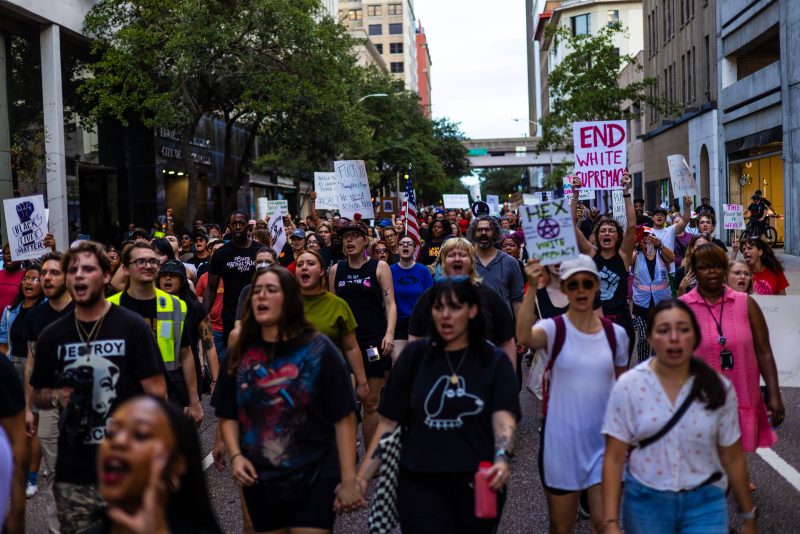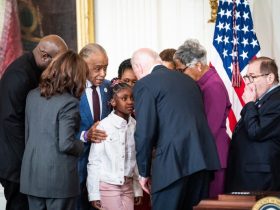Former president Donald Trump, the front-runner for the Republican presidential nomination, has yet to issue any public statements on the racially motivated killings of three Black people in Jacksonville, Fla. — placing him among only a handful of candidates who have not prominently condemned the violence.
Trump, a Florida resident, has posted on social media about other topics dozens of times since Saturday, when a White man armed with an assault-style rifle emblazoned with swastikas fatally shot three Black people in a Dollar General store. But he has posted nothing about the shootings on his Truth Social platform.
Nor was The Washington Post able to find any record of Trump publicly speaking on the subject in campaign events or media interviews. His campaign declined repeated requests to point out anything he might have said.
Trump’s silence is largely consistent with how he has responded to other mass killings since he left the White House. But it stands in contrast to denunciations of the violence from at least five of his competitors for the Republican nomination.
Florida Gov. Ron DeSantis, who was campaigning in Iowa on Saturday, quickly returned to his state and condemned the shooter’s motives at a vigil for the victims. In an acknowledgment that the perpetrator was refused entry to the campus of Edward Waters University — a historically Black college — before the shooting, DeSantis promised to use state resources to bolster security at Florida’s HBCUs.
But he was greeted with fury and a chorus of boos at the vigil from critics who said his denunciation of the violence rang hollow in light of policies they believe have minimized the threat of racism. DeSantis frequently alleges that Democrats distort the issue of racism, and he has come into conflict with Black lawmakers and civil rights leaders over some of his policies. Some of his allies praised him for going to the vigil Sunday despite knowing that the crowd was likely to be unfriendly to him.
Entrepreneur Vivek Ramaswamy, who is polling third nationally after Trump and DeSantis, said frequent public discussion of race in recent years has “thrown kerosene on that racism.” He also pointed to authorities’ statement that the shooter had experienced a mental health crisis in 2017.
“I think we have to have the courage in this country to bring back a practice of putting back psychiatrically ill people who pose a risk to their communities into psychiatric institutions, not just drugging them up,” Ramaswamy said on CNN’s “State of the Union.”
Former vice president Mike Pence called the shootings “an act of evil” and called for armed guards at schools, increased support for law enforcement and the swift use of the federal death penalty against anyone convicted of a mass killing.
Two Republican candidates, former South Carolina governor Nikki Haley and Sen. Tim Scott (S.C.), were in office when a self-declared white supremacist shot and killed nine Black parishioners at a church in Charleston, S.C., in 2015. Both denounced the Jacksonville shooter’s racism, with Haley saying the violence “takes me back to a dark place” and Scott calling it “horrendous.” Both have also said they do not believe the United States is a racist country.
The Post could find no record of former New Jersey governor Chris Christie, whose presidential campaign is built largely around his criticism of Trump, publicly commenting on the Jacksonville killings. A spokesman for his campaign did not respond to questions about whether Christie had done so.
On Tuesday and Wednesday, The Post asked a spokesman for Trump’s campaign whether the former president intended to comment on the Jacksonville shooting. The spokesman did not respond.
Trump has mostly been silent after mass killings since leaving office, even since becoming a 2024 White House candidate in November. When he has commented, he has often been vague.
“I think they had a tragic event in Buffalo — tragic event in Buffalo with numerous people being killed,” he said after a White man killed 10 Black people in a racially motivated attack at a grocery store in Upstate New York in May 2022. “In 18 months in Afghanistan, we lost nobody.”
After 11 people were killed at a Lunar New Year celebration in Monterey Park, Calif., Trump sought to deflect attention to Capitol Police shooting one of his supporters during the Jan. 6, 2021, attack on the U.S. Capitol.
“[O]ur January 6th protestors, over a Rigged Election, have had their lives ruined despite nobody killed except true Patriot Ashli B,” he said on Truth Social. “This situation will be fully rectified after 2024 Election.”
While in office, Trump sometimes broke with norms as he responded to mass killings. When he traveled to El Paso and Dayton, Ohio, after a pair of back-to-back shootings there in 2019, he unleashed a slew of attacks on local leaders and posed for thumbs-up photos. The perpetrator in El Paso, whose racist manifesto featured parallels with Trump’s anti-immigration rhetoric, later pleaded guilty to federal hate-crime and weapons charges.
Sensitivity to race became a central issue in the 2020 campaign. Among other things, Trump critics pointed to his reversal of regulations meant to increase the availability of affordable housing for minorities, his reworking of racial sensitivity training at federal agencies to no longer reference “White privilege” and his claim that there were “very fine people on both sides” after a woman was killed during a violent protest by white nationalists in Charlottesville.
Trump has responded with indignation to claims that his words actions could be construed as racist, with a former White House adviser saying that Trump said, “No one loves Black people more than me,” The Post previously reported.
Nearly 6 in 10 Americans said in 2019, during the heart of Trump’s term, that they believed American race relations were generally bad, according to a survey by the Pew Research Center.
Isaac Arnsdorf contributed to this report.








